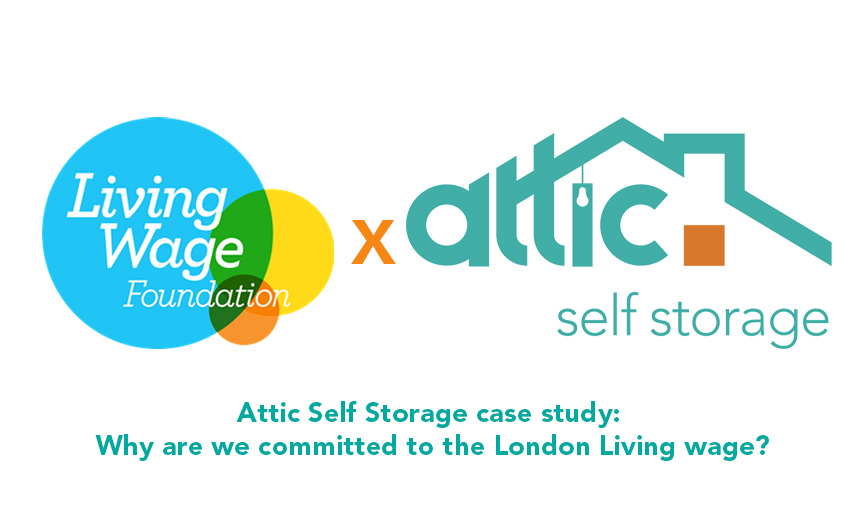New Year’s resolutions. So many of us start a brand-new year with the intention of sticking to a brand-new set of goals. Whether they be health related, fitness, education, work or centred around our family, friends and loved ones. But have you ever wondered just how long an average Brit sticks to their New Year’s resolution? Do we only tend to keep up with them for a couple of days, weeks, or months? Or do the majority of us manage to keep them all yearlong?
In this article, we share all of this and more, including the most common New Year’s Resolution themes, the age groups that are most likely to stick to (or ditch!) their New Year’s Resolutions, and which parts of the UK have plans to set them for 2024. So, let’s dive right in!
New Year’s Resolution Statistics for 2024 in a Nutshell
No time to scroll? No worries! Here’s a summary of our key New Year’s Resolution statistics for 2024.
- 68% of UK adults plan on making a New Year’s Resolution in 2024
- 8.5% of people making a resolution think they’ll give up on it immediately
- On average, UK adults expect their New Year’s Resolutions for 2024 to last 13 weeks.
- Whilst nearly half (49%) think they’ll give up within the first 3 months
- The most common New Year’s Resolution UK adults have planned for 2024 is to lose weight, with 15% setting weight loss as their goal
- The New Year’s Resolution people think they’re most likely to give up on quickest is stopping drinking alcohol
- Whilst the goal we have the most faith in ourselves to stick to for the longest is creating a new hobby or spending more time on current hobbies
- The UK city most keen to set a New Year’s Resolution for 2024 is Belfast, with over three quarters of the population (77%) planning on doing so
How many people are setting New Year’s Resolutions for 2024?
Many of us like to start a new trip around the sun with good intentions. Whether they be more general, such as “Next year I’m going to really keep on top of things” or more concrete, such as “Next year, I’ll ride my bike at least 4 times a week”. Even if you’re not much of a goal-setter, there’s often someone you know, maybe a family member, work colleague or friend who plans on setting a New Year’s Resolution to help them work on their personal, professional or social progression.
But just how many of us Brits are planning on making a New Year’s Resolution for 2024?
To find out, and discover just how realistic our goals are, in November 2023, we used the market research company Censuswide to ask a demographically representative sample of 2,000 UK adults:
“If you’re planning on making a New Year’s Resolution for 2024; how long, realistically, do you think you’ll stick to it?
- 0 days (I’ll give up immediately)
- Within the first week (1 to 6 days)
- Within the first month (1 to 3 weeks)
- 1 to 3 months
- 4 to 6 months
- 7 to 9 months
- 10 to 11 months
- Until Christmas 2024 (over 11 months but under 12 months)
- All year (12 months)
- All year and into the next/subsequent year(s)
- N/A – I’m not planning on making a New Year’s Resolution for 2024 / Unsure

As you can see from the graph:
- More than two thirds (67.75%) of UK adults plan to make a New Year’s Resolution for 2024.
- Whilst 32% of people say they have no plans to set a New Year’s Resolution.
- Slightly more women than men plan on making a New Year’s Resolution, with 68.8% of women and 66.6% of men saying they have plans to do so for the new year.
How about when it comes to age? Are we more likely to set goals for the new year as we age? Or are New Year’s Resolutions more common amongst younger generations? To find out, we asked all of our survey participants which age group they belonged to. The results revealed that:
- When it comes to age 25- to 34-year-olds are most likely to have plans to set a New Year’s resolution, 88.5% of this age category in the UK having plans to do so.
- The next most likely age group is 18- to 25-year-olds, with 87.5% making plans for their New Year’s resolution.
- Whilst the least likely age group to set a New Year’s resolution is those aged 55+, as less than half (49%) of this age group say they’re setting a New Year’s Rresolution for the new year.
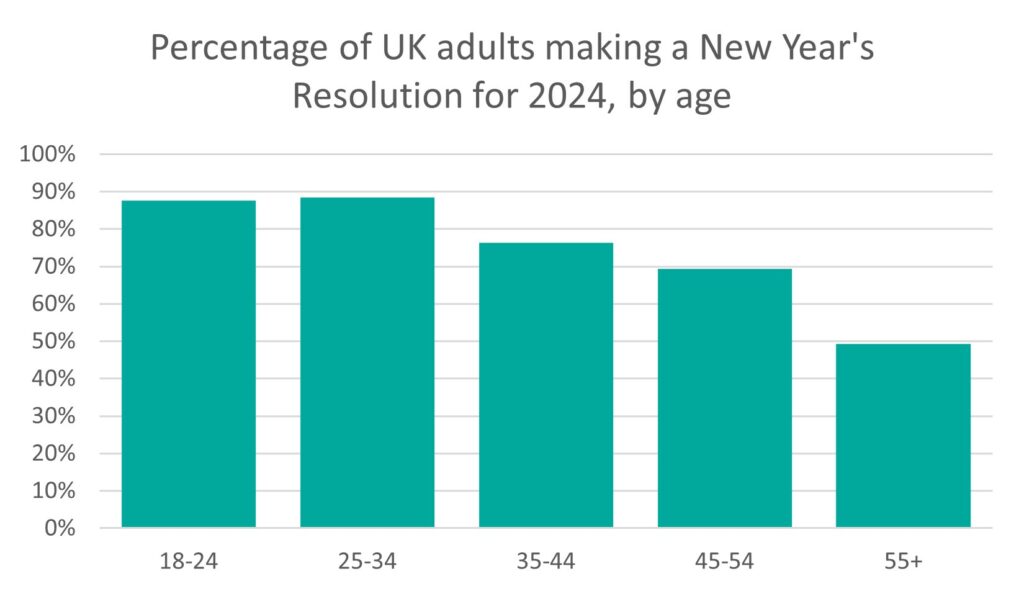
What is the most popular New Year’s Resolution theme?
As well as finding out just how popular New Year’s Resolutions are in 2024, we also wanted to discover which themes these resolutions are most commonly centred around. To do so, we asked the 1,355 participants who said they’re making resolutions:
What theme, if any, will your New Year’s Resolution be for 2024?
- Lose weight
- Improve fitness / performance
- Improve finances
- Improve diet
- Improve mental health
- Travel more
- Start a new hobby or spend more time on a current hobby / hobbies
- Make more time for friends and family
- Drink less alcohol / stop drinking
- Learn a new skill or language
- Get a new job, promotion or improve performance at work
- Stop smoking
- Unsure / there is no specific theme that my New Year’s resolution will be for 2024
- Other (please specify)
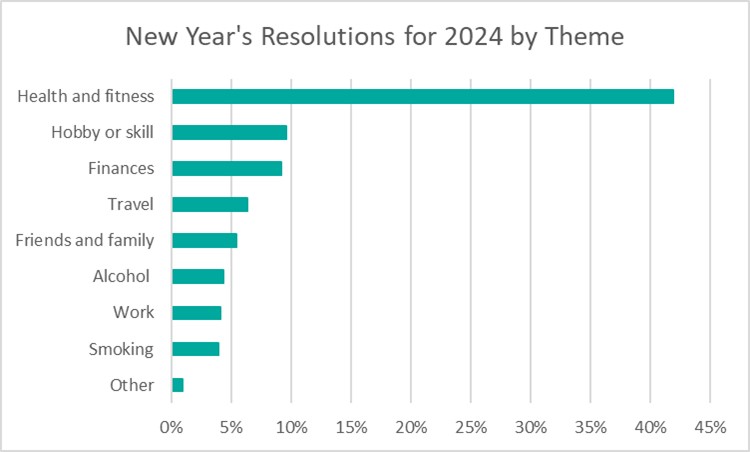
As you can see from the above graph, our survey findings revealed:
- Health and fitness related goals are by far the most popular, with 42% of resolutions for 2024 being related to this, including lose weight (15%), improve fitness (10%), improve diet (9%) and improve mental health (9%).
- The second most common New Year’s Resolution
sthemesare resolutions related to hobbies and skills, with 5.5% wanting to learn a new skill or language and 4% wanting to start a new hobby or spend more time on a current one.
- This is followed by improving finances (9%), travelling more (6%) and spending more time with friends and family (5.5%).
- Giving up booze (4%) and cigarettes (4%) were also resolutions of many, alongside getting a new job, promotion or improving performance at work (4%).
- Whilst 15% say they haven’t yet decided on a theme, or not yet decided what their New Year’s Resolution will be.
Which goals are we most likely to give up on? And which are we most likely to stick to?
So we know the most common themes us Brits set our goals around for the new year, but which types of resolutions do we stick to for the longest?
Our survey found that:
- Those planning on creating a new hobby or spending more time on current hobbies in the New Year, predict that they’ll do so for 3.3 months on average, making this the resolution UK adults feel is easiest to stick to.
- This is followed by job related goals (3.2 months) and those related to finances (3.1 months).
- Whilst ditching alcohol is the New Year’s Resolution we feel we’ll give up on soonest, with the typical UK adult making this goal predicting that they’ll manage it for just 2.2 months. But at least people believe they’ll survive dry Jan!
- Making more time to see friends and family, alongside improving our diets and fitness levels, are also amongst the least achievable New Year’s Resolutions in the eyes of the British public.
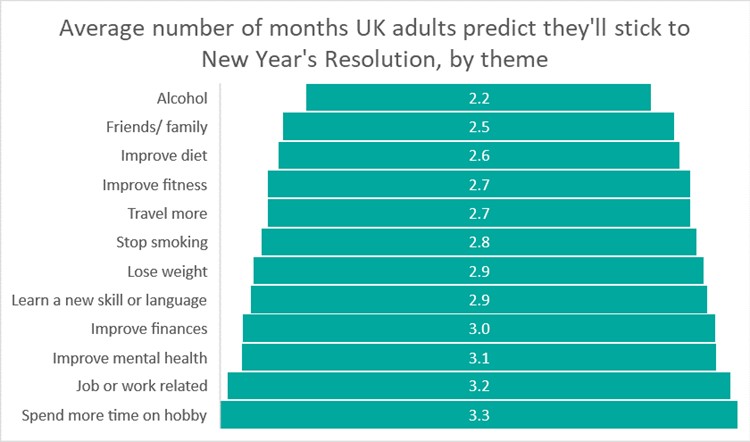
Commitment to New Year’s Resolution, by age
Do we become more determined to stick to our New Year’s Resolutions as we age? Or is it something we’re more motivated to do the younger we are?
Our findings revealed:
- When it comes to age, those aged 55+ appear to have the least faith in their abilities to stick to their New Year’s Resolutions, predicting overall that they will keep them for less than 2 months.
- This is followed by the youngest UK adults, those age 18-24; feeling that they’ll stick to their goals for 2 and a half months on average, giving up by mid-March.
- Meanwhile, the age group most likely to stick to their resolutions is 35–44-year-olds, believing they will stick with them until the second week of April (3 month and 1 week) on average.
Which cities are most motivated to stick to their goals for the New Year?
So now we know which age groups feel they’re most likely to stick to their resolutions, but how about where we live? Which part of the UK is officially the most determined to stick to New Year’s Resolutions for the longest? Our data showed:
- People in Southampton and Birmingham have the most in faith in themselves when it comes to sticking to their resolutions, predicting that they’ll do so for just over 3 months, not giving up until the start of April.
- Whilst the most pessimistic city when it comes to New Year’s Resolutions appears to be Bristol, with Bristolians estimating that they’ll give up before the end of February, keeping to them for less than 8 weeks!
| Town/City | Average number of months people predict they’ll stick to their New Year’s resolutions |
| Southampton | 3.04 |
| Birmingham | 3.04 |
| Plymouth | 3.01 |
| London | 2.94 |
| Norwich | 2.89 |
| Cardiff | 2.8 |
| Glasgow | 2.7 |
| Nottingham | 2.67 |
| Edinburgh | 2.53 |
| Brighton | 2.45 |
| Newcastle | 2.39 |
| Liverpool | 2.37 |
| Manchester | 2.34 |
| Sheffield | 2.21 |
| Leeds | 2.16 |
| Belfast | 2.16 |
| Bristol | 1.95 |
Searching for inspiration for New Year goals
Arguably, one of the most difficult parts of making a New Year’s Resolution is coming up with an idea for one! From deciding to floss your teeth every day for the entire year to committing to read at least 10 pages of your book each night, there are many to choose from, but deciding which is right for you is no easy task.
But we all know the first thing we do when trying to decide or come up with an idea…. We turn to Google! And it seems that’s no different when it comes to New Year’s Resolution ideas. In fact, our analysis of Google UK search volumes conducted using the tool Ahrefs, found:
- In January 2023, 4,760 searches were carried out for the term ‘New Year’s Resolutions’ in the UK.
- According to Google Trends, the number of people heading online in their search for New Year’s Resolution inspiration seems to be declining, with interest reducing by nearly a half from 2018 to 2022.
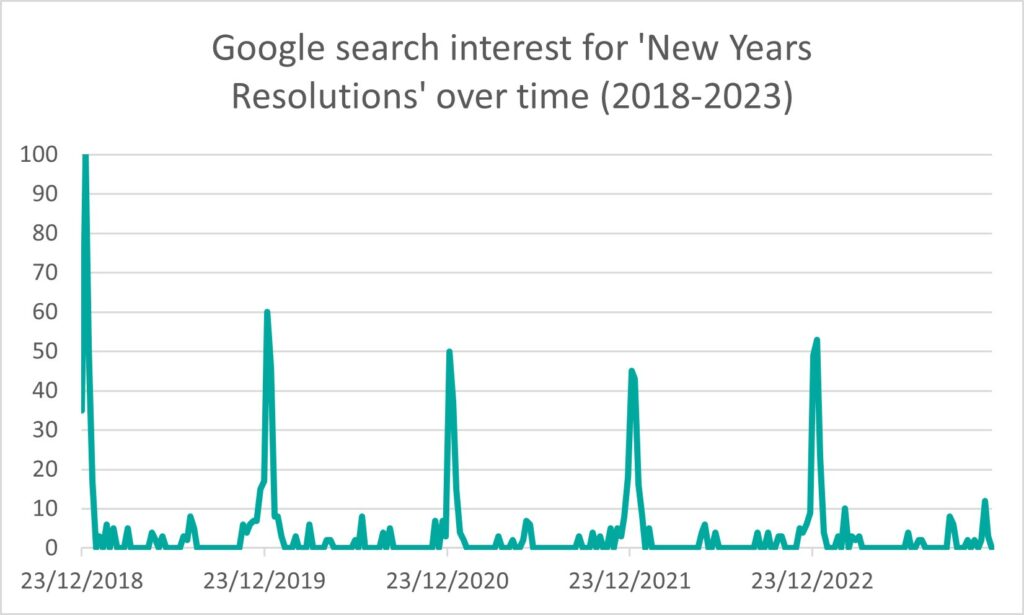
Please note: Data in the above chart is based on search interest measured by Google Trends, with peak interest being 100. Interest = a query’s search volume divides by the total number of searches completed in the given time period and geographic region.
People living in Salford conducted more searches for the term ‘New Year’s Resolution ideas’ than any other UK city. Followed by Cambridge, Slough and Oxford.
Fun facts about New Year’s Resolutions
Want more fun facts and figures related to New Year’s Resolutions? We’ve got you covered:
- Did you know the ancient Babylonians are said to have been the first people to make New Year’s resolutions 4,000 years ago? It came about as part of their 12-day religious festival, Akitu, in which they promised their gods they’d pay their debts and return any objects they had borrowed.
- Also, January was named after the two-faced Roman god, Janus, who looks forward to new beginnings, and backwards for reflection and resolution.
- In the Medieval era, knights would reaffirm their commitment to chivalry by engaging in a unique tradition known as the “Peacock Pledge.” This annual ceremony was held as the year drew to a close, and saw knights place their hands on a majestic peacock, symbolizing their unwavering commitment to chivalry throughout the upcoming year.
And that’s a wrap!
We hope you’ve enjoyed our New Year’s Resolution facts, figures and statistics! If you’d like any more information about our survey or to see the raw data from its findings, please just let us know at [email protected].
And if one of your own New Year’s Resolutions is to have a clear out, move house or change business premises, why not check out our London-based self storage solutions.


